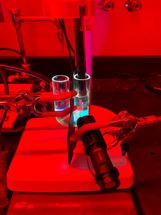Bayer product for isolating arsenic from drinking water gains important approval in United States
Leverkusen – Bayoxide® E33, a ferric oxide developed by Bayer for separating arsenic from drinking water, has cleared an important registration hurdle in the United States: NSF International, an independent US testing organization, has certified the Bayer product according to the "ANSI/NSF Standard 61" for drinking water system components. "This certification is recognized and supported by virtually all US water supply companies. It therefore opens the door to the American market for our product, which we market through or partner, Severn Trent Services," said Dr. Hendrik Kathrein, Manager of the Competence Center for technical oxides and specialty pigments /Bayer Chemicals. The certification is of added importance because of the imminent sharpening of arsenic thresholds in drinking water in the US.
Arsenic gets into the groundwater – and thus into the drinking water – in the form of a complex bound ion as a result of the leaching out of natural resins and minerals. As medical studies have shown, high concentrations can, with long-term contamination, lead to skin problems and in the worst case can trigger skin cancer. Other forms of cancer have also been associated with this element.
In the southwest of the United States in particular, arsenic concentrations in the groundwater are very high indeed, and a large proportion of the population in the States of California, New Mexico and Arizona is supplied with drinking water that contains arsenic. The present legal threshold in the USA is 50 micrograms per liter (µg/L), but from 2006, in line with a recommendation from the World Health Organization (WHO), this figure will be cut to 10 µg/L. In California, there is even talk of lowering the limit to 5 µg/L. "Particularly against this background, it becomes clear just what challenges are facing the American water utilities. This is why Bayer and Severn Trent have been so determined to offer an effective, NSF- certified adsorber for arsenic as early as possible," explained Kathrein.
The certification procedure for Bayoxide E33 consisted of two stages. To begin with, the product underwent thorough analysis at NSF International in the USA. The tests focused on the search for toxic substances in the granules such as heavy metals like cadmium and mercury or organic substances like nitroso compounds that can cause cancer. Apart from this, the production of the arsenic adsorber was subjected to an audit. "In some cases, this went well beyond the requirements of ISO 9001 and 14001," said Kathrein. Additional, even stricter testing conditions were applied in cases where the criteria affected the safety of drinking water as a food product. They covered not only the quality and safety of the raw materials but also possible sources of contamination and the standards of the quality control.
Most read news
Topics
Organizations
Other news from the department research and development

Get the chemical industry in your inbox
By submitting this form you agree that LUMITOS AG will send you the newsletter(s) selected above by email. Your data will not be passed on to third parties. Your data will be stored and processed in accordance with our data protection regulations. LUMITOS may contact you by email for the purpose of advertising or market and opinion surveys. You can revoke your consent at any time without giving reasons to LUMITOS AG, Ernst-Augustin-Str. 2, 12489 Berlin, Germany or by e-mail at revoke@lumitos.com with effect for the future. In addition, each email contains a link to unsubscribe from the corresponding newsletter.





















































